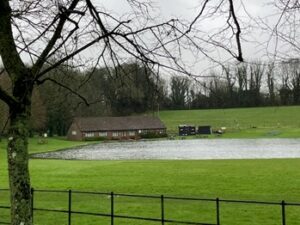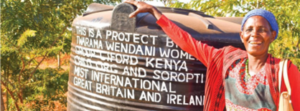 One could easily mistake the water in the above photograph for a small lake or reservoir. However, it is a photograph taken very recently of the cricket pitch in Lyminge, the village where I live in Kent. It is hoped that by the summer the water will have either drained away naturally or been pumped away, but will it have been put to good use? I would doubt it and by the time the summer comes, we will possibly have a hosepipe ban!
One could easily mistake the water in the above photograph for a small lake or reservoir. However, it is a photograph taken very recently of the cricket pitch in Lyminge, the village where I live in Kent. It is hoped that by the summer the water will have either drained away naturally or been pumped away, but will it have been put to good use? I would doubt it and by the time the summer comes, we will possibly have a hosepipe ban!
The last year has seen well above the normal average rainfall in the UK with homes, villages and towns being subjected to flooding resulting in people having to move out of their homes and businesses with the resultant upset and upheaval. However, many countries in the world have experienced the complete opposite, with lack of water causing devastation and, in some instances, loss of life, particularly in the case of children.
UN-Water co-ordinates the observance of World Water Day on behalf of the United Nations. The campaign for World Water Day 2024 is ‘Water for Peace’ and it is such a relevant theme at this time when there is so much conflict in the world. This year the Task Force of UN-Water Members’ and Partners’ is being organized by the UN Economic Commission for Europe (UNECE) and the UN Educational, Scientific and Cultural Organisation (UNESCO), with a further 16 entities including Human Right 2 Water, Office of the High Commission on Human Rights (OHCHR), the United Nations Environment Programme (UNEP), the World Health Organisation (WHO) and the International Federation of Red Cross and Red Crescent Societies (IFRC).
Whilst access to water is a human right, 2.2 billion people have to live without safely managed drinking water. Water governance is vital to avoid increased competition, an escalation of water crises and emergencies across the world. The World Health Organisation notes “Water scarcity impacts 40% of the world’s population, and as many as 700 million people are at risk of being displaced as a result of drought by 2030.”
One of the main focuses of World Water Day is to work towards the achievement of Sustainable Development Goal (SDG) 6 ‘Water and Sanitation for All’ by 2030. In addition, water is key to our adaptation to Climate Change, and it is the crucial link between our climate system, human society and the environment.
In March 2019, UNICEF launched the ‘Water Under Fire’ Campaign, which included its Water Under Fire Report with the aim of drawing global attention to three fundamental areas where changes are urgently needed to achieve access to safe and sustainable water and sanitation in fragile situations:
- Stop attacks on water and sanitation, infrastructure and personnel,
- Build a water, sanitation and hygiene (WASH) sector that can consistently and predictably provide high-quality water and sanitation services in emergencies,
- Link life-saving humanitarian responses to the development of sustainable water and sanitation systems for all.
Three additional volumes addressing these fundamental areas were subsequently released as part of the campaign:
Volume 1 – issued in August 2019: Emergencies, development and peace in fragile and conflict-affected contexts – focuses on the need for immediate action to accelerate water and sanitation services delivery in fragile and conflict-affected contexts, prevents water-related tensions between groups and political entities and ensures the right to water and sanitation for every child.
Volume 2 – issued in November 2020: Strengthening sector capacity for a predictable, quality humanitarian response. It is dedicated to the water, sanitation and hygiene (WASH) sector’s capacity to deliver a predictable, quality humanitarian WASH response, and to provide a change agenda and road map towards strengthening this capacity.
Volume 3 – issued in May 2021: Attacks on water and sanitation services in armed conflicts and the impacts on children. This volume features five areas of armed conflict: Iraq, Syria, Yemen, Ukraine and the State of Palestine.
Since these three volumes were issued, we now have the situations in Afghanistan, Ukraine and Gaza, where once again safe and sustainable water and sanitation are being severely affected with dire consequences. Many countries in Africa and other parts of the world also suffer from lack of clean water and adequate sanitation.
What can Soroptimists do to help those countries where access to clean water and adequate sanitation are causing such a heavy loss of life?
Individuals and clubs can support the work of organisations like Amref Health Africa UK who provide clean drinking water and access to adequate sanitation in rural and suburban communities, thus reducing the spread of water-related diseases.
 In November last year I received a report from Margaret Ikiara, Executive Director of CIFORD in Meru, Kenya, where a former SIGBI Federation Project taught women how to grow crops for their families and to sell in order to earn a living. Margaret reported that during the last rainy season, CIFORD had embarked on supporting the women with water tanks to harvest rain water, provision of energy efficient stoves and tree seedlings for planting. Training is carried out to enable the members to understand the husbandry of trees. The energy efficient stoves will help the women reduce the cutting down of trees for firewood. To support a family with a water tank costs USD 250 and with an energy efficient stoves USD 7 – this could be a possible project for a club or region?
In November last year I received a report from Margaret Ikiara, Executive Director of CIFORD in Meru, Kenya, where a former SIGBI Federation Project taught women how to grow crops for their families and to sell in order to earn a living. Margaret reported that during the last rainy season, CIFORD had embarked on supporting the women with water tanks to harvest rain water, provision of energy efficient stoves and tree seedlings for planting. Training is carried out to enable the members to understand the husbandry of trees. The energy efficient stoves will help the women reduce the cutting down of trees for firewood. To support a family with a water tank costs USD 250 and with an energy efficient stoves USD 7 – this could be a possible project for a club or region?
Some clubs and members support the work of Toilet Twinning, who note on the front page of their website that “Every day 700 children under 5 die from diarrhoea linked to unsafe water, sanitation and poor hygiene”. Supporters who donate £60 to twin their toilet receive a certificate to print at home and hang in their toilet showing a photograph of their twinned toilet and GPS co-ordinates so that the twin’s location can be looked up on Google Maps.
Clubs wishing to organise some activities, or an event focussed on World Water Day 2024 will find the resources available at the UN link detailed at the bottom of this page helpful. These resources would also be helpful for those clubs working with schools.
Access to clean, safe drinking water and adequate sanitation is indeed a basic human right and something which many of us take for granted. Therefore, when we turn on the cold tap for a glass of drinking water, flush the toilet, have a shower, run a bath or do some washing, let us spare a thought for those throughout the world for whom clean water and adequate sanitation are not available and consider what we might be able to do to help to change this situation.
By Yvonne Freeman, Programme Action Officer, SI South East England


